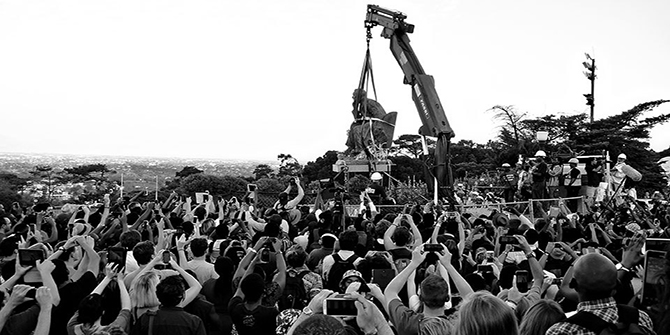African activists are frequently excluded from speaking on international platforms about global issues such as climate change, despite Africa being disproportionately affected. The erasure of Ugandan activist Vanessa Nakate at the COP26 UN climate summit is another example of how western media portrays ‘white saviour’ solutions to the problem, reinforcing the need for real global South involvement.
On 2 November 2021, an image of Scottish First Minister Nicola Sturgeon and Swedish climate change activist Greta Thunberg appeared on the internet, with Vanessa Nakate, a Ugandan Climate Change activist, cropped out the frame. The three women were having a conversation on Sky News at the COP26 international climate summit in Glasgow. The cropped image was tweeted by former British MP and educationist Thelma walker, who later deleted it when it attracted outrage. This incident follows similar displays of blatant racial representation, misrepresentation and non-representation of Black Africans by the Western press. This case also demonstrates the ongoing erasure of global South voices in climate debates.
In January 2020, there was a social media backlash after Associated Press cropped Nakate out of a picture in which she appeared (or disappeared) alongside four fellow (white) climate change activists: Greta Thunberg, Loukina Tille, Luisa Neubauer and Isabelle Axelsson. While Nakate’s recent appearance on the cover of Time magazine, celebrated by Ugandans, is a step in the right direction, her recent media coverage at COP26 takes us back.
Nakate, Sturgeon and Thunberg have all enjoyed media coverage at the conference, but Nakate continues to be portrayed as ‘the other’, and is less often acknowledged, when she isn’t completely ignored. An article in the Scottish Sun captioned a picture that prominently featured the three together: ‘The Swedish climate activist, 18, received a personal welcome from the Scottish First Minister as the climate change summit enters its second day.’ In the Glasgow Times, Sturgeon is shown as having a conversation with Nakate while Thunberg looks on. The caption reads: ‘Greta Thunberg challenges Nicola Sturgeon on what more Scotland can do on climate change’. Other outlets followed suit by only stating Vanessa’s name and, perhaps, her age, with no mention of who she is or what she does or where she is from. She has previously been misrepresented as a Zimbabwean activist by Reuters.
Why is this such a big deal? In Uganda, and Africa at large, there are few courageous young women, through the opportunities granted, who take to the world stage and challenge action on global issues such as climate change. We have long been made to believe that we are not good enough to address matters on this scale – that we should wait for some western saviour.
Nakate’s rise to global platforms resists the monopoly of power wielded by the ‘first world’. It reverses the status quo from a ‘third world’ perspective, and we Africans should be proud of her.
There will inevitably be significant pushback from a global society that is still frequently Eurocentric. The West’s white saviourism in art and media has long been rightly criticised, yet the effect of presenting Nakate as less of an activist, as an African, is a classic example of how racist representations persist in global media debates on climate change, an issue most affecting Africa, despite having contributed the least to the problem.
All the more reason for Africa and the global South to have a say in this debate. It is no surprise that western countries want to stand tall and save the day. With the pandemic, widespread hunger and largescale migration, among other issues, producing challenges worldwide, racial gimmicks aimed at the world’s most affected places are only harmful.
Photo: Vanessa Nakate, a 24-year-old climate activist from Uganda. Credit: National Observer, Licensed under CC BY-NC-SA 2.0.





